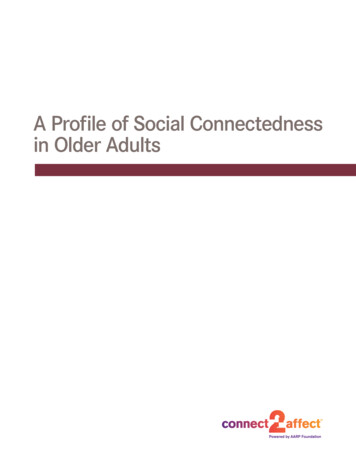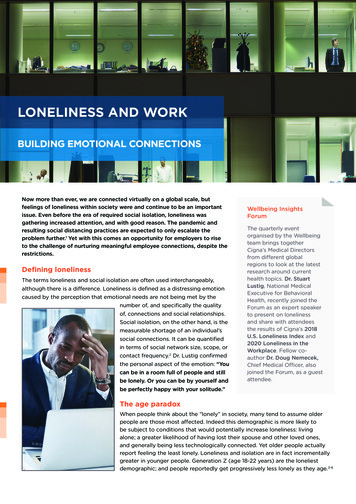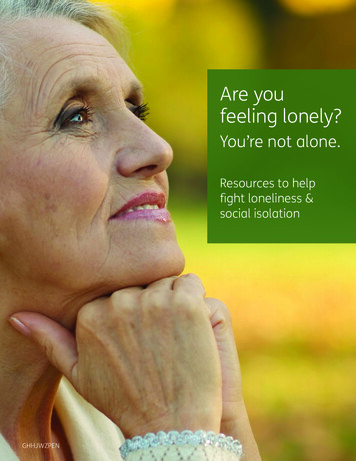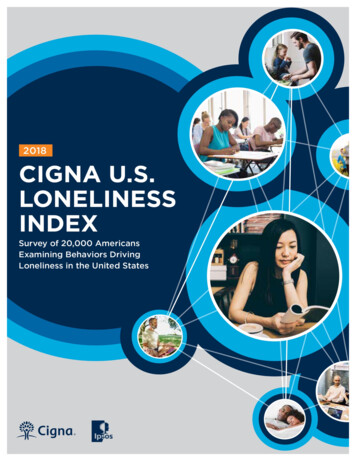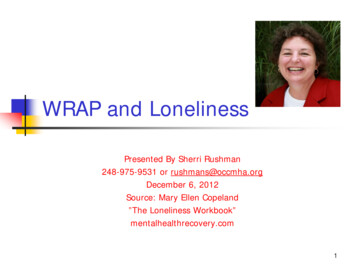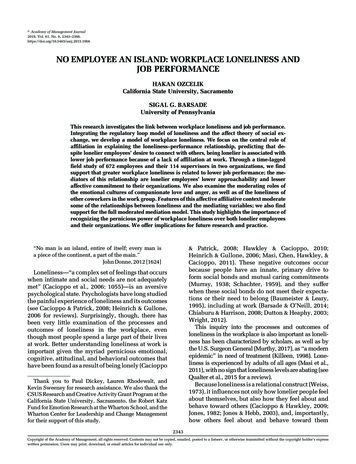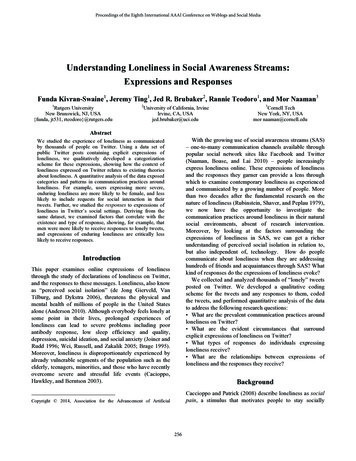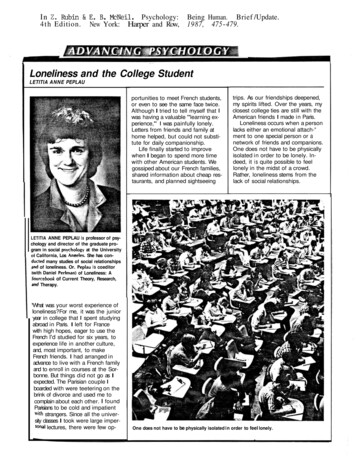
Transcription
In 2. Rubin & E. B. McNeil. Psychology:4 t h Edition. New York: Harper and Row,Being Human. Brief /Update.1987, 475-479.Loneliness and the College StudentLETITIA ANNE PEPLAUportunities to meet French students,or even to see the same face twice.Although I tried to tell myself that Iwas having a valuable "learning experience," I was painfully lonely.Letters from friends and family athome helped, but could not substitute for daily companionship.Life finally started to improvewhen I began to spend more timewith other American students. Wegossiped about our French families,shared information about cheap restaurants, and planned sightseeingtrips. As our friendships deepened,my spirits lifted. Over the years, myclosest college ties are still with theAmerican friends I made in Paris.Loneliness occurs when a personlacks either an emotional attach-"ment to one special person or anetwork of friends and companions.One does not have to be physicallyisolated in order to be lonely. Indeed, it is quite possible to feellonely in the midst of a crowd.Rather, loneliness stems from thelack of social relationships.LETITIA ANNE PEPLAU is professor of psychology and director of the graduate program in social .osvcholoev,-. at the UniversityCalifornia, Los Aneeles. She has coniucted many studies of social relationshipsind of loneliness. Or. Peplau is coeditorwith Daniel Perlman) of Loneliness: A;ourcebook of Current Theory, Research,md Therapy.-What was your worst experience ofloneliness?For me, it was the junioryear in college that I spent studyingabroad in Paris. I left for Francewith high hopes, eager to use theFrench I'd studied for six years, toexperience life in another culture,and, most important, to makeFrench friends. I had arranged inadvance to live with a French familyand to enroll in courses at the Sorbonne. But things did not go as Iexpected. The Parisian couple Iboarded with were teetering on thebrink of divorce and used me tocomplain about each other. I foundParisians to be cold and impatientwith strangers. Since all the university classes I took were large impersonal lectures, there were few op-One does not have to be physically isolated in order to feel lonely.
ical health. Lonely people reporttwenty statements. Half the statemore symptoms of upset such asments describe negative feelingsheadaches, poor appetite, and sleepand thoughts that people may haveproblems. In studies using physiowhen they are lonely. Half describelogical measures to assess thepositive aspects of a satisfying socialbody's immune response system,life; these are scored in reverse soJanice Kiecolt-Gla er(1984a, b) hasthat a low score indicates greaterfound that lonely people may beloneliness. How would you answerthe sample questions given in Box I? less able to fight off infections effectively. We don't yet understandWe have found that most nonwhy loneliness i s linked to the imlonely college students say theymune system. Perhaps loneliness"rarely" experience the negativeitself has an effect, or perhaps therefeelings described in the UCLAare some behaviors engaged in byScale; the average score on queslonely people, such as greater usetions i s about 2. In contrast, lonelyof alcohol or drugs, that in turn afstudents who signed up for a threeweek "loneliness clinic" reportedfect the immune system.In a longitudinal study, followinghaving these negative experiencesthe same people over a two-year"sometimes" or "often"; their averperiod, Dan Russell and Carolynage score was 3 or higher. New colCutrona (1985) studied the health oflege students who were testedshortly after arriving on campus forpeople over age 65. Those individuals who were the loneliest at thetheir freshman year reported modinitial testing were more likely to beerate feelings of loneliness; theirinstitutionalized and to die duringscores were between 2 and 3.Research using the UCLA Lonelithe subsequent two years. Amongthe least lonely old people, only 4ness Scale and other lonelinesspercent moved from their ownmeasures has begun to show thathomes into a nursing home; amongsevere and persistent loneliness canthe loneliest group, 22 percenthave serious consequences for peomoved to an institution. And theple's mental health (Peplau andloneliest people were four times asGoldston, 1984). Lonely people arelikely to die during the two-yearmore likely to suffer from depresperiod as were the least lonely. Sevsion and anxiety. They are morelikely to abuse alcohol or drugs anderal factors may combine to makeare more likely to contemplate orthese lonely old people more vulnerable to illness. Feelings of loneliattempt suicide.ness may themselves be detrimentalThe most recent studies suggestthat loneliness may also affect physto health. In addition, lonelinessmay be associated with other riskfactors, such as a poorer immuneresponse system or the absence offriends who can provide care andDirections: .Indicate how often you feel the way described in each of the folencouragement.lowing statements. Circle one number for each.One of the first theorists to callattention to loneliness was RobertStatementNever Rarely Sometimes OftenWeiss. In an influential book pub1. I lack companionship1234lished in 1973, Weiss identified two*2. I have a lot in common with thedistinctkinds of loneliness, eachpeople around me1234linked to the absence of one of the3. No one really knows me well1234basic provisions of social relation*4. I feel in tune with the peopleships discussed in Chapter 14around me1234(pages 450-451). The loneliness of5. I am no longer close to anyone1234emotional isolation results from theloss or absence of an intimate emoQuestions 2 and 4 should be scored in reverse, that is 1 4, 2 3, 3 2, 4 1.Source: Russell, Peplau, and Cutrona (1980).tional attachment, such as might beIn its mildest forms, lonelinesscan be no more than a momentarydesire for companionship. Christie,a young woman I interviewed, saidthat she often felt lonely when herhusband worked late at the office,but she explained that this didn'treally bother her much because sheknew that he would eventuallycome home. At the other extreme,loneliness can be a chronic problemthat persists for years. PsychiatristDavid Burns (1985) recalls that hewas lonely for the first twenty-sixyears of his life: "From the time Iwas a child, I felt ugly and awkward. .I was rarely invited toIn high school, peopleparties. .respected me for my seriousnessand intelligence-but I was lonelyand didn't feel close to very manypeople" (pages 17-18).Although most people sufferfrom loneliness at some time intheir life, psychologists have beenslow to study this everyday problem. Systematic research on loneliness began only about ten yearsago, but in that time loneliness hasbecome a major area of research.An important step in learningabout loneliness was the creation ofreliable paper-and-pencil tests tomeasure loneliness. One measure i sthe UCLA Loneliness Scale that DanRussell, Carolyn Cutrona, and I developed. The UCLA Scale asks youto rate how often you have had theexperience described in each of.
oneliness results from the lack of an emotional attachment or a network of friends.rovided by a dating partner orpouse. The loneliness of social isoition results from the loss or abence of a network of social ties.'he socially lonely person feels cutiff from companionship and theneaningful, identity-enhancing acivities provided by friends and covorkers.Weiss has found that one type ofelationship cannot readily substiUte for another in alleviating loneliless. Thus, a person suffering fromI loss of a love relationship i s likelyto feel painfully lonely, even thoughshe may have children at home orfriends to spend time with. Onedivorced mother described her experience of emotional isolation inthese terms:Your house is so noisy all day long,phones, people, kids, all kinds ofaction going on and come eighto'clock everybody's in bed, andhere's this dead silence. Like thewhole world has just come to an end.,411 of a sudden you get this feelinga t you're completely alone, that'here is no one else in the world. YOUlook out the window, you walk backand forth from room to room, youwatch television, and you're dead.(Weiss, 1973, page 136)And people who have close emotional attachments may still feelgreat loneliness if they lack a network of friends. Consider thenewlywed couple from Ohio whoset out for Alaska to seek their fortune in a new community. Untilthey make friends with neighbors orcoworkers and form ties to theirnew social world, they are likely toexperience social loneliness.Millions of Americans suffer fromloneliness. National surveys havefound that as many as one quarterof adults-over 50 million peoplehave recently felt severely lonely(Revenson and Johnson, 1984). Although loneliness occurs among allgroups in our society, it i s especiallyprevalent among those who are recently widowed or divorced (Peplauand Perlman, 1982). The loss of asignificant love relationship is amajor cause of loneliness. Anotherresearch finding is that loneliness islinked to age. Folk wisdom has itthat youth i s a time of great sociability and old age is a time of loneliness. Yet most surveys have foundthe opposite: loneliness is mostcommon among teenagers andyoung adults and appears to decrease in older age groups. Collegestudents are one of the groups mostlikely to suffer from loneliness.Perhaps the main reason that.young adults are so vulnerable toloneliness is that they confrontmany social transitions. Movingaway from home, going to college,starting a new job-all involve readjustments in social relations that canlead to loneliness. Young adultsoften leave behind the familiarworlds of high school, home town,and family to venture into new social worlds on their own. One coblege student commented that "Afterbeing voted in junior and seniorhigh 'Best Personality' and 'MostPopular,' 1 had to start over."In a recent study, Phillip Shaverand his colleagues at the Universityof Denver (1985) investigated thesocial changes experienced by 400students during their first year incollege. During the summer beforecollege, the students were contacted by mail and asked to complete detailed questionnaires aboutthemselves and their relationships.They were then recontacted early inthe fall, during the winter, and finally in the spring of their freshmanyear t o fill out additional questionnaires. Most students reported thatthe transition to college was themost difficult move or transitionthey had ever experienced. The researchers also concluded that thesestudents' social lives underwent asignificant upheaval.During freshman year, old friendships and love affairs tended towither. More than half of theprecollege romances ended, andthose that continued were rated asless satisfying in the spring thanthey had been during the previoussummer. Although the average student quickly found a new group ofcasual acquaintances, he or she felt
Going to college involves changes in social relationships that can lead to loneliness.less popular now than during highschool. Many of the new friendships and romances started duringfreshman year were short-lived. Andalthough many students continuedto have contact with precollegefriends, they found these friendships less satisfying as the year progressed. O n the bright side, loneliness peaked in severity during thefall and then declined steadilythrough the year as satisfaction withnew social relations increased. Byspring, most students had reestablished a circle of friends, althoughthey did not yet feel as close tothese friends as they had to theirhigh-school friends.What advice can researchersoffer to lonely people? First, farfrom being a sign of weakness,loneliness is a manifestation of basichuman needs for intimacy and social connectedness-needs we allshare. Like physical pain, lonelinessis a useful warning that somethingis amiss-in this case that weshould pay more attention to oursocial life. Second, studies showthat, given a little time, most peoplesuccessfully overcome loneliness.Moving to a new city, suffering theend of a love affair, or beinghousebound due t o illness can allproduce loneliness. But most people rise to these challenges and reestablish satisfying social lives. Carolyn Cutrona (1982) found, forinstance, that although 75 percentof UCLA freshmen were lonely atthe start of fall term, only 25 percent were still lonely by spring.Similar patterns have been foundfor those experiencing divorce, bereavement, or a move to a newtown. Patience and persistence payoff for most people most of the time.Beyond these broad generalizations, specific suggestions must betailored to the needs of particularindividuals. What might help alonely freshman might be of littleuse to an elderly widow or a divorced business executive. Let'sconsider a few issues relevant tocollege students.Research has identified some ofthe personal characteristics that mayprevent people from creating rewarding social lives and, as a result,increase the likelihood of beinglonely (Peplau and Goldston, 1984).Some lonely people need to improve their social skills so that theycan interact more comfortably andcompetently with others. Sometimesshyness is a problem. People whoare terribly shy get anxious in socialsituations, find it hard to initiatesocial relations, and fear taking social risks. Some lonely people appear to have a style of interactingthat makes it hard for others to getto know them.Warren Jones (1985) and his colleagues at the University of Tulsahave carefully observed the way thatlonely college students act whenthey meet a new person. In a typical study, students first complete aloneliness questionnaire. Then, aspart of another study, apparentlyunrelated to loneliness, they areasked to spend five minutes "getting acquainted" with another college student. Unbeknownst to thestudents, Jones matches each pairso that one person i s high in loneliness and the other i s not lonely. Asthe students converse, their interaction is videotaped and later coded.In these brief interactions, lonelystudents typically behave quite differently from students who are notlonely. In general, lonely studentsact in a more self-focused and unre-
sponsive way. For instance, lonelystudents asked fewer questions oftheir partner, talked more aboutthemselves, and arbitrarily changedthe topic of conversation moreoften. In another study, Jonesfound that lonely students mademore negative evaluations of theirpartner, were less accurate in describing the partner's personality,and liked the partner less. Otherresearchers have found that lonelystudents disclose less intimate information about themselves to othersand are perceived by others as "difficult to get to know" (Solano, Batten and Parish, 1982). Taken together, these findings portray atleast some lonely people as selffocused, unresponsive, and insensitive to new social situations.In some cases these self-defeating behavioral styles may be anoriginal cause of loneliness; inother cases they may be a reactionto the experience of being lonely.In either case, these styles can prevent lonely people from establishingnew relationships and so causeloneliness to persist over time. Totry to improve these faulty socialstyles, Jones and his colleagues(1982) developed a short trainingprogram that taught students suchskills as how to ask questions andhow to continue the topic of conversation begun by a partner. In afollow-up, Jones found that studentswho received the skills training behaved in less self-focused ways andreported significant reductions inboth loneliness and shyness compared to a control group that received no instruction. At some colleges, student counseling centersnpw offer programs to help students polish their social skills.Another factor in loneliness islow self-esteem (Peplau andGoldston, 1984). Especially whenloneliness persists for a long time,people tend to think badly of themselves-to feel uninteresting, unattractive, and unlovable. If this selfcriticism points to specific behaviorsthat can be improved, such as bet-ter grooming or listening more attentively to others, it can be useful.But when self-criticism turns to general feelings of inadequacy, incompetence and self-pity, it can be extremely harmful. Psychiatrist DavidBurns (1985) believes that the firststep in overcoming loneliness islearning to like yourself. Lonelypeople who feel that they have littleto offer are hardly likely to attractnew friends. So Burns adviseslonely people to develop a talent,skill, or hobby, to get involved in aworthwhile cause, and to treatthemselves kindly. Learning to enjoyyour own company when you arealone can be an important prerequisite for overcoming loneliness.So far, our discussion has focused on personal characteristicsthat contribute to loneliness. It isequally important, however, to consider how situational factors can influence loneliness. Although lessresearch has been done on thistopic, we can consider some illustrations.The story of my problems as anAmerican trying to make friends inParis suggests that when a person issignificantly "different" from othersin the social environment, it isWhen a person is different from others inhis social environment, it may be harder tomake friends.harder to make friends. A generalprinciple in love and friendship isthat similarity attracts. As a result,we may have a harder time makingfriends if we are the only youngperson in our apartment building,the only woman majoring in chemistry, or the only Hispanic on thevolleyball team.Situations can also limit the opportunities that people have forcompanionship. It is undoubtedlyeasier to get to know people in asmall seminar than in a lecture classof 300. A student who has to work30 hours a week while taking a fullcourseload in college may have littletime for sleep, let alone socializing.Recognizing how situational factorscan affect loneliness may helplonely people to cope more effectively.Finally, loneliness research suggests that putting all your energiesinto any one relationship or assuming that one person can satisfy allyour social needs is a risky strategy.Unfortunately, the myth that truelove solves all our social problemsi s widely accepted. Hence, youngadults may tend to neglect friendship in search of romance. Ratherthan developing a close relationshipwith a best friend or nurturing closeties with companions at work orschool, people may focus on "falling in love." In her study of collegefreshmen at UCLA, Cutrona (1982)found that students who remainedlonely throughout the year werelikely to say that they were stillseeking a boyfriend or girlfriend asthe "solution" to their problem. Incontrast, those students who weresuccessful in overcoming lonelinesssaid that their success was due to"gradually making friends with thepeople around me." If there is anykey to social success, it may be todevelop a wide range of social relations with friends, family, teachers,neighbors, and coworkers. Problemswith one part of your social networkmay be easier to handle when otherrelationships provide social supportand encouragement.
the opposite: loneliness is most common among teenagers and young adults and appears to de- crease in older age groups. College students are one of the groups most likely to suffer from loneliness. Perhap
